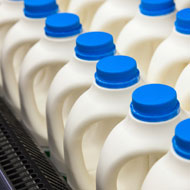Milk prices: retail giants agree to pay more

Low milk prices have seen farmers protesting in supermarkets across the UK.
In the past few days, four major UK retailers - Morrisons, Asda, Aldi and Lidl - have committed to paying farmers more for their milk.
Starting from today (17 August), Asda, Aldi and Lidl will pay processors 28 pence per litre (ppl) for all liquid milk sold within their stores.
Following recent protests across the UK, Morrisons became the first of the four retailers to take action early last week. It announced the launch of a new brand - Milk for Farmers - which promises farmers an extra 10p per litre.
In a statement on Friday (14 August), the supermarket said it will also launch a Milk for Farmers cheddar cheese in autumn, which will cost 34p more per pack than the Morrisons standard own-brand cheddar. This will deliver 10ppl back to the farmers who supply the milk.
Morrisons will also raise the price it pays to processors for liquid milk to a minimum of 26ppl, beginning later on this month and carrying on through the winter.
The news has been welcomed by key farming organisations including National Farmers' Union (NFU), Tenant Farmers Association (TFA) and lobby group Farmers For Action (FFA).
In a statement, the groups said they will continue to work with retailers to develop the cheese sector and other dairy products.



 HMRC has invited feedback to its communications regarding the employment status of locum vets and vet nurses.
HMRC has invited feedback to its communications regarding the employment status of locum vets and vet nurses.